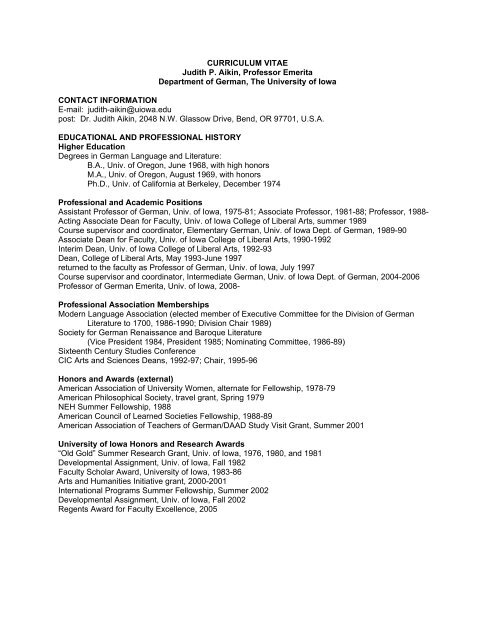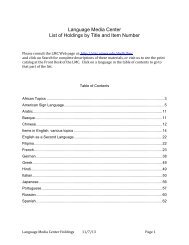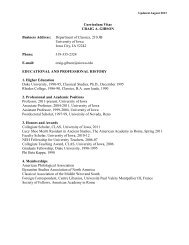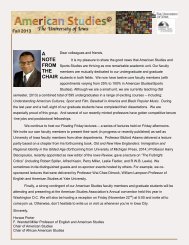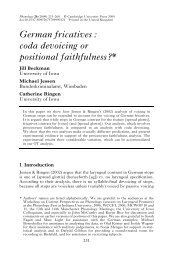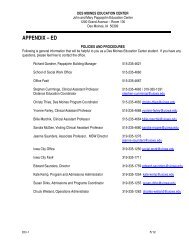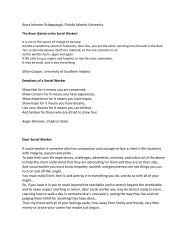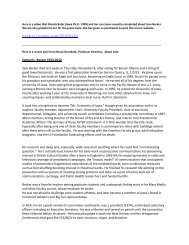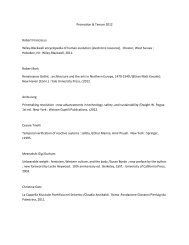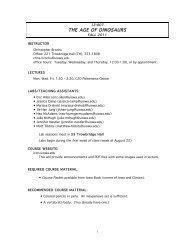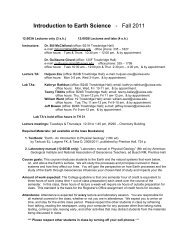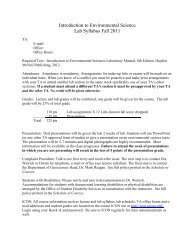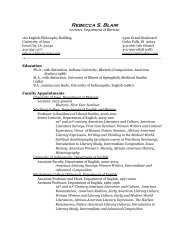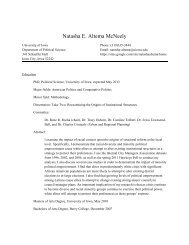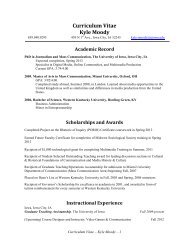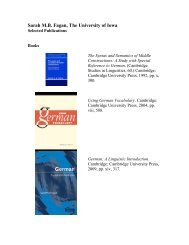CURRICULUM VITAE Judith P. Aikin, Professor Emerita Department ...
CURRICULUM VITAE Judith P. Aikin, Professor Emerita Department ...
CURRICULUM VITAE Judith P. Aikin, Professor Emerita Department ...
Create successful ePaper yourself
Turn your PDF publications into a flip-book with our unique Google optimized e-Paper software.
<strong>CURRICULUM</strong> <strong>VITAE</strong><br />
<strong>Judith</strong> P. <strong>Aikin</strong>, <strong>Professor</strong> <strong>Emerita</strong><br />
<strong>Department</strong> of German, The University of Iowa<br />
CONTACT INFORMATION<br />
E-mail: judith-aikin@uiowa.edu<br />
post: Dr. <strong>Judith</strong> <strong>Aikin</strong>, 2048 N.W. Glassow Drive, Bend, OR 97701, U.S.A.<br />
EDUCATIONAL AND PROFESSIONAL HISTORY<br />
Higher Education<br />
Degrees in German Language and Literature:<br />
B.A., Univ. of Oregon, June 1968, with high honors<br />
M.A., Univ. of Oregon, August 1969, with honors<br />
Ph.D., Univ. of California at Berkeley, December 1974<br />
Professional and Academic Positions<br />
Assistant <strong>Professor</strong> of German, Univ. of Iowa, 1975-81; Associate <strong>Professor</strong>, 1981-88; <strong>Professor</strong>, 1988-<br />
Acting Associate Dean for Faculty, Univ. of Iowa College of Liberal Arts, summer 1989<br />
Course supervisor and coordinator, Elementary German, Univ. of Iowa Dept. of German, 1989-90<br />
Associate Dean for Faculty, Univ. of Iowa College of Liberal Arts, 1990-1992<br />
Interim Dean, Univ. of Iowa College of Liberal Arts, 1992-93<br />
Dean, College of Liberal Arts, May 1993-June 1997<br />
returned to the faculty as <strong>Professor</strong> of German, Univ. of Iowa, July 1997<br />
Course supervisor and coordinator, Intermediate German, Univ. of Iowa Dept. of German, 2004-2006<br />
<strong>Professor</strong> of German <strong>Emerita</strong>, Univ. of Iowa, 2008-<br />
Professional Association Memberships<br />
Modern Language Association (elected member of Executive Committee for the Division of German<br />
Literature to 1700, 1986-1990; Division Chair 1989)<br />
Society for German Renaissance and Baroque Literature<br />
(Vice President 1984, President 1985; Nominating Committee, 1986-89)<br />
Sixteenth Century Studies Conference<br />
CIC Arts and Sciences Deans, 1992-97; Chair, 1995-96<br />
Honors and Awards (external)<br />
American Association of University Women, alternate for Fellowship, 1978-79<br />
American Philosophical Society, travel grant, Spring 1979<br />
NEH Summer Fellowship, 1988<br />
American Council of Learned Societies Fellowship, 1988-89<br />
American Association of Teachers of German/DAAD Study Visit Grant, Summer 2001<br />
University of Iowa Honors and Research Awards<br />
“Old Gold” Summer Research Grant, Univ. of Iowa, 1976, 1980, and 1981<br />
Developmental Assignment, Univ. of Iowa, Fall 1982<br />
Faculty Scholar Award, University of Iowa, 1983-86<br />
Arts and Humanities Initiative grant, 2000-2001<br />
International Programs Summer Fellowship, Summer 2002<br />
Developmental Assignment, Univ. of Iowa, Fall 2002<br />
Regents Award for Faculty Excellence, 2005
SCHOLARSHIP (chronological)<br />
Publications: Books<br />
The Mission of Rome in the Dramas of Daniel Casper von Lohenstein: Historical Tragedy as Prophecy and Polemic, Stu<br />
German Baroque Drama, Twayne World Authors Series, no. 634 (Boston: G. K. Hall, 1982).<br />
Scaramutza in Germany: The Dramatic Works of Caspar Stieler, Penn. State Series in German<br />
Literature (University Park, Pennsylvania State Press, 1989).<br />
A Language for German Opera: The Development of Forms and Formulas for Recitative and Aria in<br />
Seventeenth-Century German Libretti, Wolfenbütteler Arbeiten zur Barockforschung, no. 37<br />
(Wiesbaden: Harrassowitz, 2002). Abstracted in RILM Abstracts of Music Literature.<br />
Publications: Scholarly Articles in refereed Journals<br />
“Pseudo-ancestors in the Genealogical Commissions of Maximilian I,” Renaissance and Reformation, XIII<br />
(1977), 8-15.<br />
“Egyptian Captivity and the Theme of Freedom in Lohenstein’s Cleopatra,” Argenis, 2 (1978), 159-186.<br />
“Guarini’s Il Pastor fido in Germany: Allegorical and Figural Aspects,” Studi Germanici, XVI,1<br />
(1978), 125-48.<br />
“And they changed their lives from that very hour: Catharsis and Exemplum in the Baroque Trauerspiel,”<br />
Daphnis, 10 (1981), 241-55.<br />
“Practical Uses of Comedy at a Seventeenth-Century Court: The Political Polemic in Caspar Stieler’s Der<br />
Vermeinte Printz,” Theatre Journal, December 1983, 519-32.<br />
“Genre Definition and Genre Confusion in Gryphius’ Double Bill: Cardenio und Celinde and Herr Peter<br />
Squentz,” Colloquia Germanica, 16 (1983), 1-12.<br />
“Romantic Comedy as Religious Allegory: The Millennial Kingdom in Caspar Stieler’s Die erfreuete<br />
Unschuld,” The German Quarterly, 57 (1984), 59-74.<br />
“The Audience within the Play: Clues to Intended Audience Reaction in German Baroque Tragedies and<br />
Comedies,” Daphnis, 13 (1984), 187-201.<br />
“Satire, Satyr Plays, and German Baroque Comedy,” in Satire in der Frühen Neuzeit, ed. Barbara Becker-<br />
Cantarino, (Amsterdam: Rodopi, 1986), 155-74; same as Daphnis, 14 (1985), 759-778.<br />
“Who Learns a Lesson? The Function of Sex Role Reversal in Lessing’s Minna von Barnhelm,” Women<br />
in German Yearbook, 3 (1986), 47-61.<br />
“Happily Ever After: An Alternative Affective Theory of Comedy and Some Plays by Birken, Gryphius,<br />
and Weise,” in Absurda Comica: Studien zur deutschen Komödie des 16. und 17. Jahrhunderts,<br />
ed. Hans Wagener (Amsterdam: Rodopi, 1988), 55-76; same as Daphnis, 17 (1988).<br />
“The Comedies of Andreas Gryphius and the Two Types of European Comedy,” The Germanic Review,<br />
63 (1988), 114-120.<br />
“‘Das klingt sehr tragisch’ - Lessing’s Minna von Barnhelm as Embodiment of the Genre Discussion,”<br />
Lessing Yearbook, XX (1988), 15-27.<br />
“Creating a Language for German Opera: The Struggle to Adapt Madrigal Versification in Seventeenth-<br />
Century Germany,” Deutsche Vierteljahrsschrift, 62 (1988), 266-89. Abstracted in RILM<br />
Abstracts of Music Literature.<br />
“The Merchant and the Moor of Venice in Lessing’s Minna von Barnhelm,” Michigan Germanic Studies,<br />
15 (1989), 171-89.<br />
“Narcissus and Echo: A Mythological Subtext in Harsdörffer’s Operatic Allegory Seelewig (1644),” Music<br />
and Letters, 72 (1991), 359-71. Abstracted in RILM Abstracts of Musical Literature.<br />
“Heinrich Schütz’s Die Bußfertige Magdalena (1636),” Schütz-Jahrbuch, 14 (1992), 9-24. Abstracted in<br />
RILM Abstracts of Musical Literature.<br />
“Heinrich Schütz and Martin Opitz: A New Basis for German Vocal Music and Poetry,” Musica e Storia,<br />
ed. Lorenzo Bianconi et al., 1 (1993), 29-51. Abstracted in RILM Abstracts of Musical Literature.<br />
“August Buchner’s Die Bußfertige Magdalena (1636),” Daphnis, 22 (1993), 1-26.<br />
“Opitius Redivivus: A Posthumous Patron for Martin Opitz, Founder of German-Language Opera,”<br />
Colloquia Germanica, 26 (1993), 211-26.<br />
“Misattributed Melissa, or Let’s give David Elias Heidenreich his due,” Daphnis, 23 (1994), 37-60.<br />
“The Musical-Dramatic Works of David Schirmer,” Daphnis, 26 (1997), 401-35.<br />
“Private Piety in Seventeenth-Century Germany: The Devotional Compilations of Caspar Stieler,”<br />
Daphnis, 29 (2000), 221-279.
“The Devotional Songs of Caspar Stieler,” Daphnis, 30 (2001), 97-158.<br />
“Die Letzte ihres Geschlechts. Aemilie Juliane von Schwarzburg-Rudolstadt als letzte Gräfin von Barby,”<br />
Blätter der Gesellschaft für Buchkultur und Geschichte, 5 (2001), 9-37.<br />
“Der Weg zur Mündigkeit in einem Frauenleben aus dem 17. Jahrhundert. Genesis und<br />
Publikationsgeschichte der geistlichen Lieder der Gräfin Aemilie Juliane von Schwarzburg-<br />
Rudolstadt,” Wolfenbütteler Barock-Nachrichten, 29, no. 1 (2002), 33-59.<br />
“Songs by and for Women in a Devotional Songbook of 1703: Women’s Voices for Women’s Voices,”<br />
Daphnis, 31, no. 3/4 (2002): 593-642.<br />
“Gendered Theologies of Childbirth in Early Modern Germany and the Devotional Handbook for Pregnant<br />
Women authored by Aemilie Juliane, Countess of Schwarzburg-Rudolstadt (1683),” The Journal<br />
of Women’s History, 15, no. 2 (2003), 40-67.<br />
“The Welfare of Pregnant and Birthing Women as a Concern for Male and Female Rulers: A Case<br />
Study,” Sixteenth Century Journal, 35 (2004), 9-41.<br />
“‘Wer weiß, wie nahe mir mein Ende’. Todesbereitschaft im Leben und Dichten der Gräfin Aemilie<br />
Juliane von Schwarzburg-Rudolstadt (1637-1706),” Blätter der Gesellschaft für Buchkultur und<br />
Geschichte, 10 (2006), 37-61.<br />
Publications: Chapters and Articles in edited Volumes (all refereed)<br />
“The Lyre and the Liar in the Lyric Poetry of the German High Middle Ages,” in: The Lyrical Arts: A<br />
Humanities Symposium, ed. Erling B. Holtsmark and <strong>Judith</strong> P. <strong>Aikin</strong>, special issue of Ars Lyrica<br />
(1988), 83-105.<br />
“’Fertigkeit’ - A Millennialist Conceit in a Dedicatory Epistle by Caspar Stieler,” in: Opitz und seine Welt:<br />
Festschrift für George Schulz-Behrend zum 12. Februar 1988, ed. Barbara Becker-Cantarino and<br />
Jörg-Ulrich Fechner, Chloe 10 (Amsterdam: Rodopi, 1990), 5-20.<br />
“Authorial Self-Consciousness in the Theater of Caspar Stieler,” in: Literary Culture in the Holy Roman<br />
Empire, 1555-1720, ed. James A. Parente, Jr., Richard Erich Schade, and George C. Schoolfield,<br />
University of North Carolina Studies in the Germanic Languages and Literatures 113 (Chapel Hill,<br />
N.C.: Univ. of North Carolina Press, 1991), 247-58.<br />
“Libretti without Scores: Problems in the Study of Early German Opera,” in: Music and German<br />
Literature: Their Relationship since the Middle Ages, ed. James M. McGlathery, Studies in<br />
German Literature, Linguistics, and Culture 66 (Columbia, SC: Camden House, 1992), 51-64.<br />
Abstracted in RILM Abstracts of Musical Literature.<br />
“Dithyrambs: Metrical and Emotional Chaos in German Baroque Drama,” in: “Der Buchstab tödt - Der<br />
Geist macht Lebendig”: Festschrift für Hans-Gert Roloff (Freie Universität Berlin), ed. James<br />
Hardin and Jörg Jungmayr (Bern: Peter Lang, 1992), 629-40.<br />
“What Happens When Opera Meets Drama, and Vice Versa? J.C. Hallmann’s Experiments and their<br />
Significance,” in: Studien zur Literatur des 17. Jahrhunderts: Gedenkschrift für Gerhard<br />
Spellerberg (1937-1996), ed. Hans Feger, Chloe 27 (Amsterdam: Rodopi, 1997), 137-58.<br />
“The Vaterunser in All Shapes and Sizes: A Poetical-Musical-Devotional Exercise in the Works of Johann<br />
Franck and Caspar Stieler,” in: Gebetsliteratur der Frühen Neuzeit als Hausfrömmigkeit.<br />
Funktionen und Formen in Deutschland und den Niederlanden, ed. Ferdinand van Ingen and<br />
Cornelia Niekus Moore, Wolfenbütteler Forschungen 92 (Wiesbaden: Harrassowitz, 2001), 207-<br />
226.<br />
“The Comedies of Andreas Gryphius and the Two Types of European Comedy,” in: Literature Criticism,<br />
vol. 89 (Detroit: Gale, 2003), pp. 139-148, reprinted as a definitive article in the segment on this<br />
author. Originally published in The Germanic Review, 63 (1988), 114-120.<br />
“Die Beteiligung von Frauen an ‘geist=reichem’ Gesang um 1700: Herzens=Music 1703,<br />
Andachts=Opffer 1705 und Freylinghausens Geist=reiches Gesangbuch 1704 mit dessen<br />
Zugabe 1705,” in: “SJngt dem HErrn nah und fern”: 300 Jahre Freylinghausensches<br />
Gesangbuch, ed. Gudrun Busch and Wolfgang Miersemann, Hallesche Forschungen 20<br />
(Niemeyer: Tübingen, 2008), pp. 123-142.<br />
“‘Ich sterbe’: The Construction of the Dying Self in the Advance Preparations for Death of Lutheran<br />
Women in Early Modern Germany,” in: Women and Death 3: Women’s Representations of Death<br />
in German Culture since 1500 (Rochester, NY: Camden House, 2010), pp. 31-50.
“The Militant Countesses of Rudolstadt (When an unruly army stops by on its way through, it’s time to call<br />
on a woman for help.),” to appear in: Gender Matters: Re-Reading Violence, Death, and Gender<br />
in Early Modern Literature and Culture (Amsterdam: Rodopi, 2010).<br />
“The Creation and Promotion of Devotional Songs by Women of the Ruling Families in Seventeenth-<br />
Century Lutheran Germany: Authorship, Dissemination, Compilation, Publication,” to appear in:<br />
Der Hof. Ort kulturellen Handelns von Frauen in der Frühen Neuzeit, ed. Susanne Rode-<br />
Breymann.<br />
“Ein Jesuslied von der radikalen Gelassenheit an Gottes Willen: Ludaemilie Elisabeth von Schwarzburg-<br />
Rudolstadt,” invited chapter to appear in: Johann Anastasius Freylinghausen und sein ‘Hällisches<br />
Gesang-Buch’: Zur Entstehung und Inhalt der bedeutendsten Liedsammlung des Pietismus.<br />
Kommentar, Vol. 3 of the edition of the Freylinghausen Pietist songbook of the early eighteenth<br />
century, ed. Dianne Marie McMullen and Wolfgang Miersemann.<br />
Publications: Summative Chapters and Encyclopedia Articles (solicited)<br />
“Baroque,” a chapter in: A Concise History of German Literature to 1900, ed. Kim Vivian (Columbia, SC:<br />
Camden House, 1992), 91-122. (A Choice Magazine selection for best scholarly books of 1994.)<br />
“Augustus Buchner,” in: Dictionary of Literary Biography: German Baroque Writers, 1580-1660, ed.<br />
James Hardin (Detroit: Bruccoli Clark Layman and Gale, 1993), 74-80.<br />
“Caspar Stieler,” in: Dictionary of Literary Biography: German Baroque Writers, 1580-1660, ed. James<br />
Hardin (Detroit: Bruccoli Clark Layman and Gale, 1993), 330-38.<br />
“Johann Rist 1607-1667,” in: The Encyclopedia of German Literature, ed. Matthias Konzett (Chicago:<br />
Fitzroy Dearborn, 2000), 826-827.<br />
Publications: Editions and Editing<br />
facsimile edition of the complete dramatic works of Caspar Stieler, with Herbert Zeman, Univ. of Vienna,<br />
and others, for the “Deutsche Nachdrucke” series (my contributions complete over ten years ago,<br />
and it appeared to founder, but after a long wait it seems to be moving again).<br />
co-editor, with Erling B. Holtsmark, of The Lyrical Arts: A Humanities Symposium, a special issue of Ars<br />
Lyrica, Journal of LYRICA, Society for Word-Music Relations, 1988, containing the proceedings<br />
of the “Symposium on the Lyrical Arts” held in April 1987.<br />
Publications: Book Reviews and Abstracts<br />
review of Rudolf Furrer, Vernunft und Leidenschaft in der Erstfassung des Trauerspiels Cleopatra von D.<br />
C. v. Lohenstein, in Argenis, 2 (1978), 352-55.<br />
review of Andreas Wang, Der ‘miles Christianus’ im 16. und 17. Jahrhundert und seine mittelalterliche<br />
Tradition, in Daphnis, 9 (1980), 652-53.<br />
abstract of an article by Ingeborg Henderson on a later medieval manuscript for Bulletin Bibliographique<br />
de la Societe Internationale Arthurienne, XXXIV (1982), 63.<br />
review of Klaus Reichelt, Barockdrama und Absolutismus, in Daphnis, 12 (1983), 711-14.<br />
review of Manfred Karnick, Rollenspiel und Welttheater, in Canadian Review of Comparative Literature/<br />
Revue Canadienne de Litterature Comparee, 11 (June 1984), 302-308.<br />
review of German Baroque Literature, ed. Gerhard Hoffmeister, in The German Quarterly, 58 (1985), 110-<br />
11.<br />
review of Studien zum Werk Daniel Caspers von Lohenstein, ed. Gerald Gillespie and Gerhard<br />
Spellerberg, in The Germanic Review, LX (1985), 147-49.<br />
review of Günter Berghaus, Die Quellen zu Andreas Gryphius’ Trauerspiel ‘Carolus Stuardus’--Studien<br />
zur Entstehung eines historisch-politischen Märtyrerdramas der Barockzeit, in The German<br />
Quarterly, 59 (1986), 134-35.<br />
review of Robert J. Alexander, Das deutsche Barockdrama, Sammlung Metzler 209, in The German<br />
Quarterly, 59 (1986), 477-79.<br />
review of two facsimile editions of works by Christian Gryphius, Der deutschen Sprache Unterschiedene<br />
Alter und Wachstum, and Poetische Wälder, both ed. Dietrich Eggers and James N. Hardin,<br />
Nachdrucke deutscher Literatur des 17. Jahrhunderts, vols. 18 and 24, in German Studies<br />
Review, X (1987), 346-47.<br />
review of Paul F. Casey, Paul Rebhun: a Biographical Study, in The German Quarterly, 61 (1988), 124-<br />
25.*
eview of Sprachgesellschaften - Galante Poetinnen (Literary Societies/Literary Women, ed. Erika A.<br />
Metzger and Richard E. Schade (Amsterdam: Rodopi, 1989), in Colloquia Germanica, 23 (1990),<br />
70-72.<br />
review of James Hardin, Johann Christoph Ettner, Eine beschreibende Bibliographie, in Colloquia<br />
Germanica, 23 (1990), 190-92.<br />
review of Bernhard Greiner, Die Komödie. Eine theatralische Sendung: Grundlagen und Interpretationen<br />
(Tübingen: Francke, 1992), in Arbitrium, 3 (1993), 267-69.<br />
review of Gerald Gillespie, ed., German Theatre before 1750 (Sachs, Gryphius, Schlegel) (New York:<br />
Continuum, 1992), in American Journal of Germanic Linguistics and Literatures, 6 (1994), 125-30.<br />
review of Ein Schauplatz herber Angst: Wahrnehmung und Darstellung von Gewalt im 17. Jahrhundert,<br />
ed. Markus Meumann und Dirk Niefanger (Göttingen: Wallstein, 1997), in The German Quarterly,<br />
72 (1999), 80-81.<br />
review of Deutsche Frauenlieder des fünfzehnten und sechzehnten Jahrhunderts, ed. Albrecht Classen<br />
(Amsterdam: Rodopi, 1999), in Daphnis, 28 (1999) 2, 426-429.<br />
review of Jane O. Newman, The Intervention of Philology: Gender, Learning, and Power in Lohenstein’s<br />
Roman Plays (Chapel Hill: U of NC Press, 2000), in The German Quarterly, 75 (2002), 104-105.<br />
review of Constantin Christian Dedekind, Neue geistliche Schauspiele 1670, facs. edition, ed. and intro.<br />
Mara R. Wade (Stuttgart: Anton Hiersemann, 2003), in Daphnis 32 (2003), 371-376.<br />
review of Anthony J. Harper, German Secular Song-Books of the Mid-Seventeenth Century (London:<br />
Ashgate, 2003), in Daphnis 33 (2004), 348-351.<br />
review: Stephanie Wodianka, Betrachtungen des Todes: Formen und Funktionen der ‘meditatio mortis’ in<br />
der europäischen Literatur des 17. Jahrhunderts (Tübingen: Niemeyer, 2004), in Renaissance<br />
Quarterly 58, no. 4 (2005), 1366-1367.<br />
review: Pietismus und Liedkultur, ed. Wolfgang Miersemann and Gudrun Busch, Tübingen: Niemeyer,<br />
2002, in The Eighteenth Century Current Bibliography, N.S. 28 (2006): 492-493.<br />
review: Aedificatio. Erbauung im interkulturellen Kontext in der Frühen Neuzeit, ed. Andreas Solbach<br />
(Tübingen: Niemeyer, 2005), in The Sixteenth Century Journal 37 (2006): 1164-1165.<br />
review: Johanna Eleonora Petersen, The Life of Lady Johanna Eleonora Petersen, Written by Herself.<br />
Pietism and Women’s Autobiography in Seventeenth-Century Germany, ed. and trans. Barbara<br />
Becker-Cantarino (Chicago: Chicago UP, 2005), in German Quarterly 79.4 (2006): 525-526.<br />
review: Anna Linton, Poetry and Parental Bereavement in Early Modern Lutheran Germany, Oxford<br />
Modern Languages and Literature Monographs (Oxford: Oxford UP, 2008), in Modern Language<br />
Review 104 (2009): 900-901.<br />
Scholarly Papers and Lectures (international, invited)<br />
“Die Beteiligung von Frauen an ‘geist=reichem’ Gesang um 1700: Herzens=Music 1703,<br />
Andachts=Opffer 1705 und Freylinghausens Geist=reiches Gesangbuch 1704 mit dessen<br />
Zugabe 1705,” paper delivered at the Freylinghausen Hymnal Symposium, Franckesche<br />
Stiftungen, Halle, Germany, October 2004.<br />
“‘Ich sterbe’: Construction of the Dying Self in the Advance Preparations for Death of Lutheran Women in<br />
Early Modern Germany”, extended paper delivered at the fourth colloquium (“Aestheticisation of<br />
Women and Death”) of the multi-year international project on the Representations of Women and<br />
Death in German Literature, Art and Media after 1500, Oxford University, Oxford, England,<br />
January 3-6, 2008.<br />
“Finding the Invisible Women Authors and Compilers of Religious Books in Early Modern Lutheran<br />
Germany,” paper delivered at the colloquium “Auf der Suche nach dem Autor religiöser Bücher,”<br />
one of a series for the international research project “Buchpraxis,” Gotha, Germany, November 8-<br />
11, 2009.<br />
“The Creation and Promotion of Devotional Songs by Women of the Ruling Families in Seventeenth-<br />
Century Lutheran Germany: Autorship, Disseminiation, Compilation, Publication,” paper delivered<br />
at the international congress “Der Hof. Ort kulturellen Handelns von Frauen in der Frühen<br />
Neuzeit,” Wolfenbüttel and Hannover, Germany, May 31 to June 2, 2010.<br />
Scholarly Papers and Lectures (refereed national forum, or invited)<br />
“King Arthur and Theodoric as Pseudo-ancestors of Maximilian I,” paper delivered at the Central<br />
Renaissance Conference, March 1976.
“Political Polemic in Filidor’s Der Vermeinte Printz: Practical Uses of Comedy at a Seventeenth-century<br />
Court,” paper delivered at Baroque Drama section of the American Society for German Literature<br />
of the Sixteenth and Seventeenth Centuries, Modern Language Association annual convention,<br />
December 1977.<br />
“Illustrious Ancestors in Theatrical Performances at Two Small Dynastic Courts: Gryphius’ Piastus and<br />
Stieler’s Die Wittekinden,” paper delivered at Baroque Drama section of American Society for<br />
German Literature of the Sixteenth and Seventeenth Centuries, Modern Language Association<br />
annual convention, December 1980.<br />
“Genre Definition and Genre Confusion in Gryphius’ Double Bill: Cardenio und Celinde and Herr Peter<br />
Squentz,” paper delivered at special section, Modern Language Association annual convention,<br />
December 1981.<br />
“Romantic Comedy as Religious Allegory: Caspar Stieler’s Die erfreuete Unschuld,” paper delivered at<br />
Pre-1700 Divisional meeting of Modern Language Association annual convention, December<br />
1982.<br />
“Barricades and Bridges: Illusionistic Theater and Illusion-Breaking Techniques in the German Baroque,”<br />
paper delivered at the pre-1700 divisional meeting of the Modern Language Association annual<br />
convention, December 1983.<br />
“The Second Son: Wolfram’s Parzival and St. Augustine’s City of God,” paper delivered at Pre-1700<br />
divisional meeting of the Modern Language Association annual convention, December 1984.<br />
“Satire, Satyr Plays, and German Baroque Comedy,” paper presented at the sixteenth- and seventeenthcentury<br />
session at the Kentucky Foreign Language Conference, April 1985.<br />
“Happily ever after: An Alternative Theory of Comedy in Seventeenth-Century Germany and Its<br />
Application in Plays by Birken and Weise,” paper presented at the session of the Society for<br />
German Renaissance and Baroque Literature at the Modern Language Association annual<br />
convention, December 1986.<br />
“The Creation of a Language for German Opera: A Scholarly Whodunit,” invited lecture, Princeton<br />
University, February 1987.<br />
“Authorial Self-Consciousness in Theatrical Works by Caspar Stieler: The Joke’s on Me!”, a solicited<br />
lecture given at the Yale University Renaissance/Baroque Congress, March 1987.<br />
“The Merchant and the Moor of Venice in Lessing’s Minna von Barnhelm,” paper presented at the session<br />
“The Reception of Shakespeare in Eighteenth-Century Continental Europe” at the MLA<br />
convention in December 1988.<br />
“Libretti without Scores: Problems in Studying Early German Opera,” invited lecture delivered at the<br />
International Conference on Music and German Literature, University of Illinois, April 1989.<br />
“White Space or Margin-to-Margin? Visualizing Reading Practices for Poetry and Song in Seventeenth-<br />
Century Germany,” paper presented at the Sixteenth Century Society Conference, St. Louis,<br />
October 1999.<br />
“Private Devotion goes Private: The Genesis and Publication History of the Song Texts of Aemilia Juliana<br />
von Schwarzburg-Rudolstadt,” paper presented at the Society for German Renaissance and<br />
Baroque Literature session at the MLA convention, December 1999.<br />
“Pietist Constructs in the Verbal and Visual Images of Aemilie Juliane, Countess of Schwarzburg-<br />
Rudolstadt (1637-1706): Persona, Exemplum, Icon,” paper presented at the Sixteenth Century<br />
Conference, Denver, October 2001.<br />
“Anonymous was a Woman, but so was Michael Hörnlein, or, One Woman’s Way from Pastoral<br />
Authorship to Pastoral Authority,” conference paper, MLA 2003 convention, December 2003.<br />
“Royal Births, Royal Babies, Dynastic Disasters: Problem Pregnancies, Infant Mortality, and Infant Care<br />
viewed through the eyes of Aemilia Juliana of Schwarzburg-Rudolstadt (1637-1706),” conference<br />
paper, SGRABL session at MLA 2003 convention, December 2003.<br />
“Woman as Man. Gender-bending in Early Modern Germany,” invited lecture, “Fruchtbringende<br />
Gesellschaft” lecture series, University of Illinois at Champaign-Urbana, April 2005.<br />
“Midwives, Wetnurses, Nurserymaids, Maiden Aunts, Godmothers, and Grandmama: The Women’s<br />
Network around Childbearing and Childrearing in the Writings of a Seventeenth-Century<br />
Countess”, paper presented at the Sixteenth Century Society Conference, October 2005.<br />
“When an unruly army stops by on the way through, it’s time to call on a woman for help: Two<br />
Countesses of Schwarzburg-Rudolstadt wield Sword and Shield”, invited paper presented at the
Mellon Conference on the topic “Gender Matters: Re-Reading Violence in Early Modern Literature<br />
and Culture,” University of Illinois at Urbana-Champaign, March 2007.<br />
“Albrecht Dürer’s account of his mother’s Catholic death in light of later Lutheran deathbed narratives,”<br />
paper presented at the Sixteenth Century Society Conference, Minneapolis, October 2007.
Work in Progress<br />
AEMILIA JULIANA: A Woman’s Life in Early Modern Germany, a book project nearly completed.<br />
“Albrecht Dürer’s account of his mother’s Catholic death as a Pivotal Text for Reformation Studies,” an<br />
article in progress, expansion of conference paper.<br />
“Hannah and her Sisters in Seventeenth-Century Germany: Biblical Role Models for Women<br />
Poets,” a planned article for which research is largely complete<br />
“Royal Births, Royal Babies, Dynastic Disasters: Problem Pregnancies, Infant Mortality, and Infant Care<br />
in the Ruling Dynasties of Early Modern Germany,” article in progress, expansion of conference<br />
paper.<br />
Work in progress that is currently in mothballs<br />
”JUDITH, an Early German dramma per musica: The Settings of the Solo and Choral Lieder by Matthäus<br />
Apelles von Löwenstern for Martin Opitz’s German Adaptation of Andrea Salvadori’s Giuditta,”<br />
coauthored with first author Susan Malecki, completed typescript in 17 pages plus eleven musical<br />
examples and their annotations, undergoing final revisions prior to submission to a musicology<br />
journal to be determined.<br />
Future projects (research in various stages of completion)<br />
“Without Rhyme or Reason: Ungereimtheit in German verse of the Seventeenth Century,” article in<br />
planning stages<br />
“What Constitutes Originality? Revisiting Caspar Stieler’s Basilene,” article in the planning stages<br />
“Lessing’s Nathan der Weise as Intertext for Brecht’s Der gute Mensch von Sezuan,” article in the<br />
planning stages<br />
“Geistliche Lieder aus Rudolstadt in Freylinghausen und anderen ‘geist-reichen Gesang-Büchern’, 1686-<br />
1721,” research largely completed<br />
Project: The “geistliche Lieder” of Ludaemilia Elisabeth von Schwarzburg-Rudolstadt<br />
Project: The Cryptogram of the Paternoster and Paternoster Cross in seventeenth-century Europe:<br />
Manifestations, interpretations, applications<br />
Publications: Contributions to Pedagogy<br />
“Bathtub Eroticism in German Medieval Literature,” Studies in Medieval and Renaissance Teaching, IX,1<br />
(Spring 1982), 3.<br />
“The Computer as a Tool in the Teaching of Translation,” Foreign Language Annals, 20 (1987), 435-38.<br />
(refereed journal)<br />
PROFESSIONAL SERVICE AND CONTRIBUTIONS TO ACADEMIC ADMINISTRATION<br />
Service to the Profession: Consultant<br />
Consultant reader, University of Iowa Press, for a book on Bert Brecht, 1977.<br />
Consultant reader, Camden Press, for a book on sixteenth-century comedy, July 1985.<br />
Outside evaluator for promotion and tenure decision of a sixteenth-century scholar, Modern<br />
Languages <strong>Department</strong>, the University of Nebraska at Lincoln, October 1985.<br />
Consultant reader, article on satire, for Daphnis journal special issue, May 1986.<br />
Consultant reader, article on Hartmann von Aue’s Erec, for PMLA, September 1986.<br />
Consultant reader, article on Lessing’s Minna von Barnhelm, for the Lessing Yearbook, October<br />
1987.<br />
Outside evaluator for a tenure decision at the Associate <strong>Professor</strong> level, German <strong>Department</strong>,<br />
University of Missouri, Columbia, September 1988.<br />
Outside evaluator for a tenure and promotion decision for the English and Comparative Literature<br />
Dept., Univ. of California at Irvine, October 1988.<br />
Consultant reader, Greenwood Press, for a book on medieval German poetry and politics,<br />
January 1989.<br />
Consultant reader, article on Lessing’s Minna von Barnhelm, for the Lessing yearbook, May 1989.
Outside evaluator for a tenure and promotion decision for the German <strong>Department</strong>, University of<br />
Wisconsin-Madison, December 1989.<br />
Consultant reader, article on “Gluttony Artists” for PMLA, March 1991<br />
Outside evaluator for promotion decision, <strong>Department</strong> of Cultural Studies and Comparative<br />
Literature, University of Minnesota, October 1992<br />
Consultant reader, article on medieval women authors for Women in German Yearbook, April<br />
1993<br />
Outside evaluator for promotion decision, <strong>Department</strong> of German and Slavic, University of<br />
Georgia, summer 1993<br />
Outside evaluator for tenure/promotion decision, <strong>Department</strong> of Germanic Languages and<br />
Literatures, University of Illinois-Urbana, summer 1993<br />
Outside evaluator for tenure/promotion decision, <strong>Department</strong> of Germanic Languages and<br />
Literatures, Rutgers University, summer 1993<br />
Consultant, review of application for stipendium from the Findel Foundation for a residency at the<br />
research institute of the Herzog August Bibliothek, Wolfenbüttel Germany, June 1994<br />
Outside evaluator for off-scale “promotion” decision, <strong>Department</strong> of Germanic Languages,<br />
University of California at Los Angeles, November 1996<br />
External evaluator for departmental review, <strong>Department</strong> of German, University of Illinois-Chicago,<br />
April 1998<br />
Outside evaluator for off-scale “promotion” decision, <strong>Department</strong> of Germanic Languages,<br />
University of California at Los Angeles, November 2000<br />
Consultant, review of application for a stipendium from the Findel Foundation for a residency at<br />
the research institute of the Herzog August Bibliothek, Wolfenbüttel Germany, December<br />
2000<br />
Consultant reader, article on musical dramas of Duchess Sophie Elisabeth von Braunschweig-<br />
Wolfenbüttel for Colloquia Germanica, first review July 2001. Second review of very<br />
substantially rewritten article, December 2001<br />
Reviewer, Fellowship Program, American Council of Learned Societies, Fall 2001<br />
Reviewer, Fellowship Program, American Council of Learned Societies, Fall 2002<br />
Textbook reviewer, Kaleidoskop (second-year German textbook), for Houghton Mifflin Company,<br />
Spring 2005.<br />
Consultant reader, article on Gryphius for Daphnis, January 2006.<br />
Service to the Profession: Presentations<br />
“Reflections of a Former Dean on Electronic Publishing in the Context of Tenure and Promotion<br />
Decision-Making,” AATG session on electronic publishing at the MLA convention, San<br />
Francisco, December 1998.<br />
Service to the Profession: Session Organizer/Moderator<br />
Chair and moderator, “German Literature 1600-1800” section, Kentucky Foreign Language<br />
Conference, April 1982.<br />
Organizer and Session Chair of special session at the Modern Language Association Convention,<br />
December 1985, on “New Perspectives on Satire in German Literature of the Sixteenth<br />
and Seventeenth Centuries.”<br />
Moderator of a session, “Christian Tragedy in the Baroque,” at the International Conference on<br />
the German Renaissance, Reformation, and Baroque Periods, University of Kansas,<br />
Lawrence, April 1986.<br />
Moderator of Baroque Literature session of the Division of German Literature to 1700 at the MLA<br />
Convention, San Francisco, December 1987.<br />
Moderator of Baroque Literature session of the Division of German Literature to 1700 at the MLA<br />
convention, New Orleans, December 1988.<br />
Organizer, three sessions of the Division of German Literature to 1700 for the MLA convention,<br />
Washington, D.C., December 1989; Chair and Moderator, session on German Baroque<br />
Literature.
Workshop leader, English translations of Rainer Maria Rilke’s novel Die Aufzeichnungen des<br />
Malte Laurids Brigge, American Literary Translators’ Association conference, Iowa City,<br />
November 1989.<br />
Moderator of Baroque Literature session of the Division of German Literature to 1700 at the MLA<br />
convention, Chicago, December 1990.<br />
Moderator and Respondant, Eleventh St. Louis Symposium on German Literature: Gender in<br />
Early Modern German Literature, March 1992, Washington University<br />
Moderator of Baroque Literature session of the Society for German Renaissance and Baroque<br />
Literature at the MLA convention, San Francisco, December 1998.<br />
Moderator of session organized by the American Friends of the Herzog August Bibliothek, at the<br />
Sixteenth Century Society Conference, October 2005<br />
Chair of session organized by the German Literature division of the Sixteenth Century Society, at<br />
the Sixteenth Century Society Conference, October 2005<br />
Chair and Moderator of session organized by the History division at the Sixteenth Century Society<br />
Conference, October 2007<br />
University and Collegiate Service (1998-2007)<br />
Chair, Advisory Board, Illumine (UI publication highlighting faculty research, scholarship, and<br />
creative works), 1999-2000 and 2000-2001 and 2002-2003<br />
Reviewer, UI Obermann Humanities Symposium applications, Spring 2000<br />
Position statement presentation, “Expectations for Tenure-track Positions and Your Research<br />
Program,” for Transitions: Graduate Studies and Preparing for a Profession, a workshop for<br />
advanced graduate students in the humanities and social sciences, UI, Fall 2000<br />
<strong>Department</strong>al representative, College of Liberal Arts and Sciences Faculty Assembly, Fall 2001<br />
Certification of translation of German documents for INS consideration of visa for new faculty<br />
member in the <strong>Department</strong> of Exercise Science, March 2002<br />
Elected member, UI Faculty Senate, 2001-2002 through 2004-2005<br />
Judge of submitted humanities papers, James F. Jakobsen Graduate Forum, Humanities<br />
Division, Spring 2002, Spring 2003, and Spring 2004.<br />
Elected member, UI Faculty Council, 2002-2005<br />
Panel member, “Rewarding Graduate Teaching”, Faculty Council Retreat, May 2002<br />
Reviewer of Arts and Humanities Initiative grant proposals, Office of VP for Research, Spring<br />
2003; and spring 2004<br />
Reviewer of Stanley Graduate Fellowships, spring 2004<br />
Member, Virtual Classroom Committee, 2003-2004<br />
External Member, Promotion Committee and <strong>Department</strong>al Consulting Group, <strong>Department</strong> of<br />
Spanish and Portuguese, Fall 2004<br />
Member, ad hoc committee editing the policy for “Criminal Background Check at point of hire”, fall 2004<br />
External Member, Promotion Committee and <strong>Department</strong>al Consulting Group, for <strong>Department</strong> of<br />
Classics, Fall 2005<br />
Public Service: Service to the State of Iowa<br />
Presenter for the spring conference of the Iowa-AATG (high school and college teachers of<br />
German): “Deutsche Kultur im Internet/ Using the Internet to Experience German<br />
Culture”, April 2003<br />
Public Service: Service to the German-American Community<br />
Co-organizer and presenter, Hymn Translation Workshop for the Amana Church Publications and<br />
Translation Committee, Middle Amana, Iowa, May 2001


